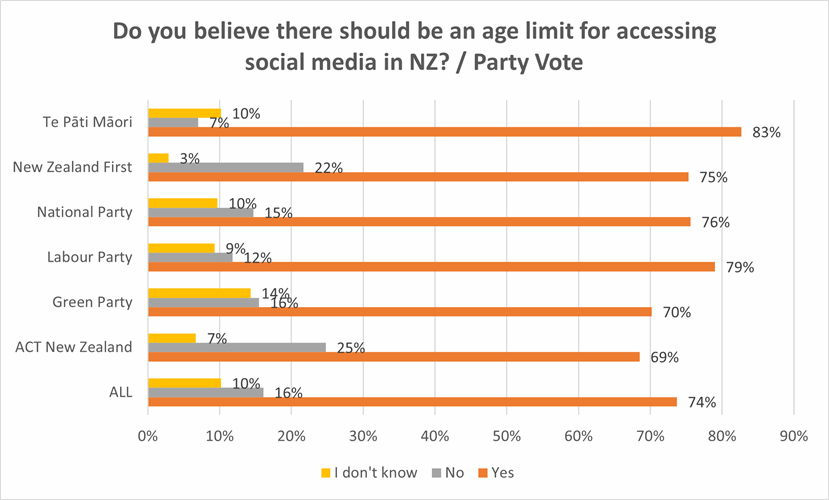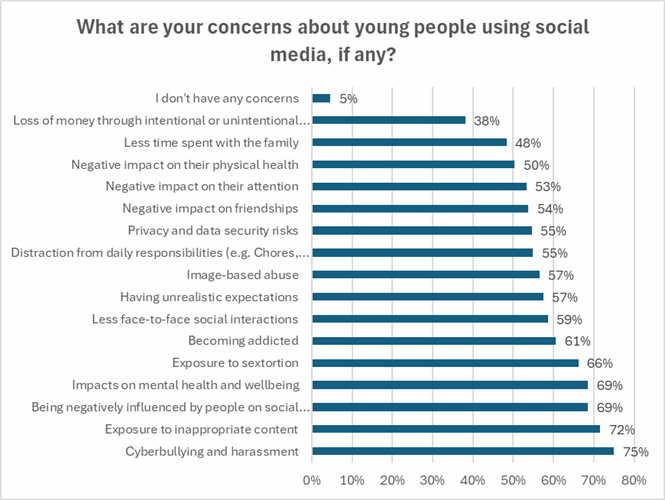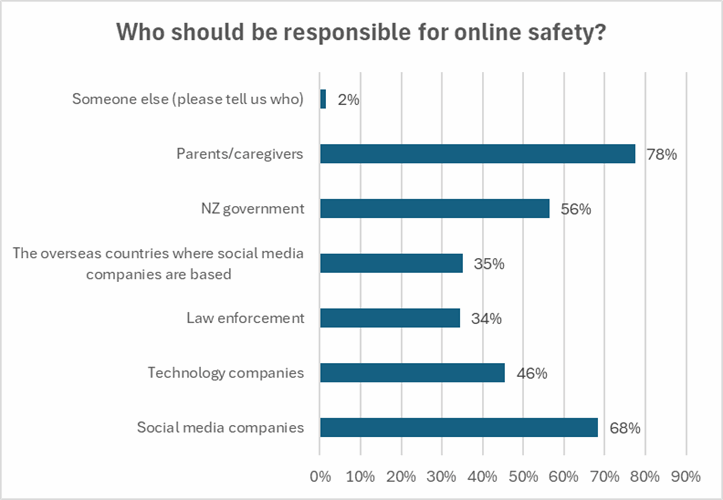News
74% favour limiting child access to social media
3 Dec 24

An overwhelming majority of adults favour limiting social media access for children in New Zealand.
A Horizon Research survey in association with Auckland University’s School of Population Health, finds 74% support setting an age limit for accessing social media, 16% oppose and 10% don’t know.

A large majority of voters for all the parties currently in Parliament want access limited, including:
- 76% of National’s voters
- 69% of Act’s
- 75% of New Zealand First’s
- 79% of Labour’s
- 70% of Green’s, and
- 83% of Te Pāti Māori’s.
Australia’s federal government passed a law last week which will lead to a ban on those 16 years-old and younger from accessing social media.
Access age in New Zealand
Most want access limited up until age 16, according to the survey.

Major concerns
The major concerns about young people using social media are cyberbullying and harassment (75%), exposure to inappropriate content (72%), being negatively influenced and impacts of mental health and wellbeing (both 69%). Exposure to sextortion concerns 66%, while 61% are concerned young people will become addicted to social media.

Who should be responsible for online safety
Large majorities think parents (78%) and social media companies (68%) should be most responsible for online safety.
56% think the New Zealand government should be.

If the country restricts the age of social media access to 16, large numbers would prefer:
- Extra support to help educate parents about social media harms (66%)
- Age-appropriate education in schools about social media harms (64%), and
- Education for parents to help children transition off social media (56%).

Public health comment: Social media harming children
Dr Samantha Marsh, of Auckland University’s School of Population Health, says social media is harmful in a variety of ways, but particularly to children.
Dr Marsh, whose research focuses on child and youth health and wellbeing, says:
“People often focus on the addictive aspect of harm, which is important, but fear of missing out is something we also need to consider, and why we need to change societal norms.
“Kids tell us they don’t want to be on social media as much as they are. We know they find it stressful but they’re so worried about missing out that they can’t put their phone down.
“Many parents know social media is harmful but because every other kid is on social media they feel like their child will be isolated. That’s why we need policy change.”
Dr Marsh says there is an opportunity cost for every minute children are on social media because they miss out on real life.
"Regulation is important because not every child is going to come from a family that is able to monitor their social media use. Their parents might not have the time and resources. Regulation protects all children.
“These products are designed to be addictive. They're also driven by algorithms that are pushing harmful content onto our kids so even with education the content gets pushed upon them.
“Years and years of public health research tells us that education alone doesn't really change behaviour.”
Herald coverage of the survey includes comment from one Government Minister.
Methodology
The November 12-19, 2024 survey of 1,511 people aged 18 or older represents New Zealand’s adult population.
At a 95% confidence level, the maximum margin of error is +/- 2.5% overall.
The sample is weighted on age, gender, ethnicity, personal income and Party Vote 2023 to match the adult population.
Contacts:
Dr Samantha Marsh,
School of Population Health, University of Auckland
Email: sam.marsh@auckland.ac.nz , telephone +64 21 400 904.
Graeme Colman, Principal, Horizon Research
Email: gcolman@horizonresearch.co.nz, telephone +64 21 848 576
HorizonPoll Online Survey system
and website developed by BEWEB
Copyright © 2010. HorizonPoll incorporating ShapeNZ - Listening to New Zealand


